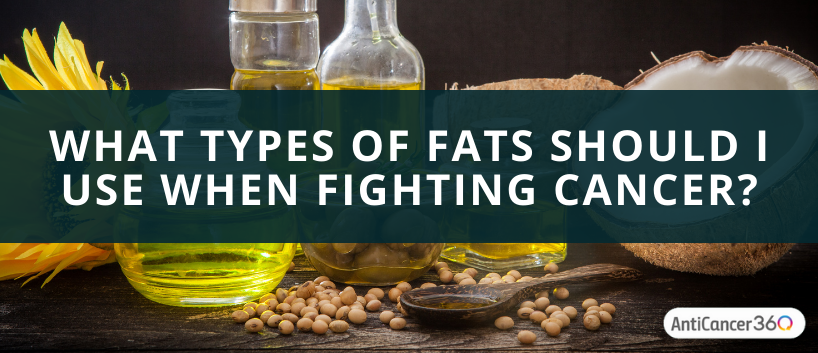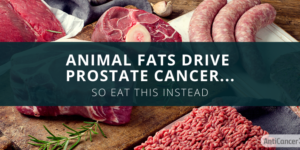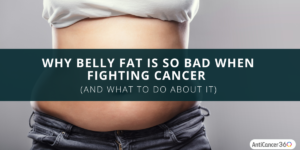Fats are one of the most fundamental substances to human life. Every single cell in your body is literally wrapped in a layer of fat.
Fats and oils are also a crucial part of our diets. And most importantly for many of us, they’re a big part of what makes food delicious.
But as delicious as dietary fats can be, most of us also have a sense how important they are for our health. So one of the questions I often get asked is, “what types of oils should I eat when I’m fighting cancer.”
This is a pretty in depth topic, but we’ll cover it all in today’s blog post. By the end of it, you’ll know exactly all the types of fats that you should focus on… as well as the fats that you should avoid when you’re fighting cancer.
You Need To Know The TYPES Of Fats You’re Eating
Now when it comes to dietary fats, there are many different kinds. And you’ll want to know what types you’re eating so that you can balance them in your diet.
Animal fats tend to be high in saturated fat. However, they also contain unsaturated fats like omega 3 and 6. This is especially true in regards to wild caught fish, but also grass and pasture raised animal products.
But when it comes to the unsaturated fats, most of them come from plants, especially nuts and seeds. These are a big source of omega 3 and 6 in your diet.
Some nuts and seeds are much richer in omega 3… and some are much richer in omega 6.
And the key is to get them in your diet in a good balance. Experts debate the “ideal ratio…” but aiming for a 1:1 ratio is a safe bet [1]. This is definitely on the more “antiinflammatory, higher omega 3 side” of the range, but you’ll probably get more omega 6’s from other foods that you eat so the 1:1 ratio will balance things out.
Here’s a list of nuts and seeds and their omega 3 to 6 ratio.
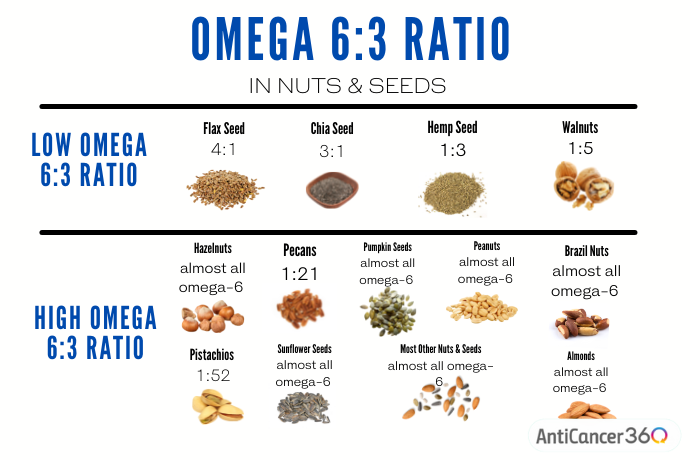
Plants can also be a source of saturated fats. Coconut oil is the most common source, but there are also things like palm oil and cocoa butter that are also sources of plant based saturated fats.
Then there are the monounsaturated fats. This is what’s most commonly thought of as the “heart healthy fats” that you find in olives, avocados and their respective oils.
These fats can also be found in cooking oil that are labeled as “high oleic” cooking oils which we’ll talk about later. This will mostly be from high oleic sunflower or safflower oil. Almond and macadamia oils are also going to be rich in monounsaturated fats like olive and avocado.
So, when you are thinking about dietary fats, I want you to think of them in groupings. Saturated fats, omega 3 and 6 fats, and omega 9 Monounsaturated fats. There’s definitely going to be overlap, but thinking of them in this way helps you understand the types of fats you’re getting in your diet.
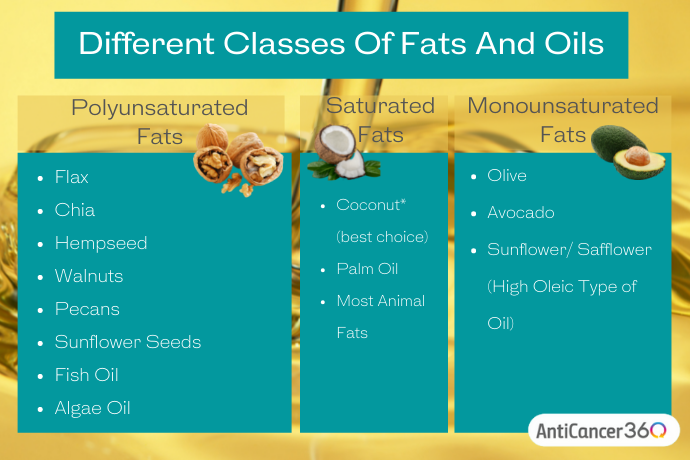
So now that you know where these types of fats come from, you’ll be able to get them in your diet in a balanced way.
Some Fats Are Important For Your Cell Oxygenation and Inflammation Control
We all know that fats are a source of calories that our bodies can use for fuel. But some of these fats actually do much more than that, and you want to make sure that you get enough of these fats in your diet.
And in this case, I’m referring specifically to omega 3 and 6 fats, especially plant based sources.
These fats actually make up large areas of your cell membranes, and they control oxygenation in your cells which is very important for functions like cell respiration [2].
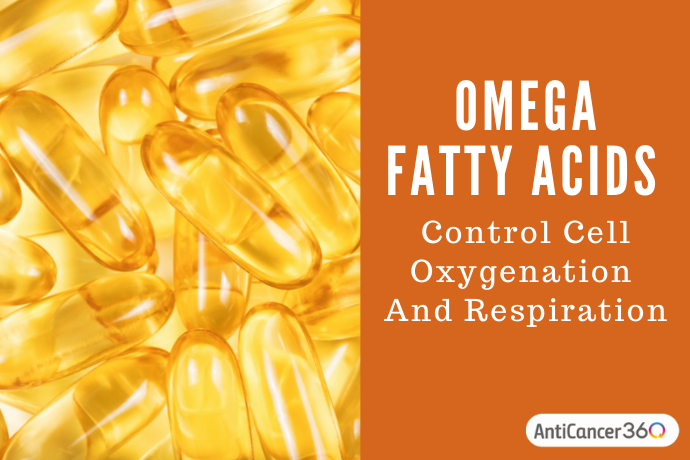
Researchers have actually done experiments where they deprived animals of these fats (only giving them other types of fats instead.) And this causes their cell respiration to decrease significantly [3].
But fortunately, this can be reversed when you balance your fat intake with the right types.
And this is important because “broken cell respiration” is one of the possible issues found in cancer cells [4].
These omega 3 and 6 fats also control inflammation in the body. And it’s widely accepted that inflammation is a major drivers of cancer [5].
These fats are literally the building blocks of various inflammatory and anti inflammatory chemicals in your body. So like we talked about later, getting these omega 3 and 6’s in the right balance is also key.
Overall, I like to have people think of things like saturated fats and monounsaturated fats more so as “fuel…” whereas omega 3’s and 6’s are also important as “structural and anti-inflammatory fats” in your cellular terrain.
You Must Avoid The “Bad Fats”
So aside from the three main groups of fats that you know about already, there’s a fourth group of “bad fats.” These are the artificially produced “trans fats.”
Trans fats are fats that have been chemically altered to last longer on store shelves. But this characteristic also makes them really unhealthy [6].
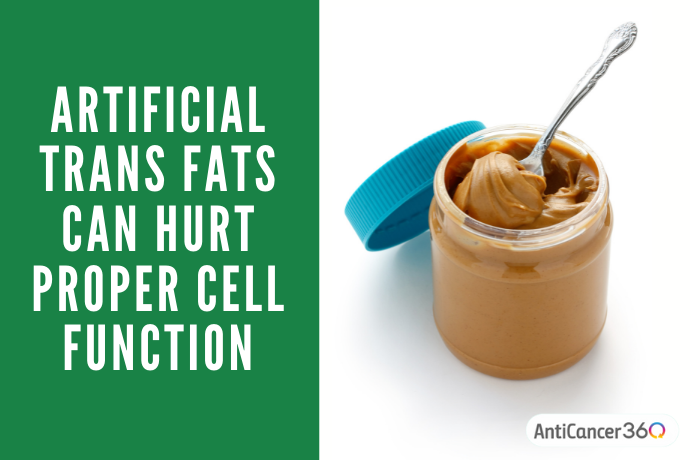
And, even though they are now only in our foods in “negligible amounts,” even these low amounts can expose your cells to lots of trans fat molecules.
So the key is to avoid anything that says “hydrogenated” or “partially hydrogenated” oils of any kind… even if the label says “0 trans fats.”
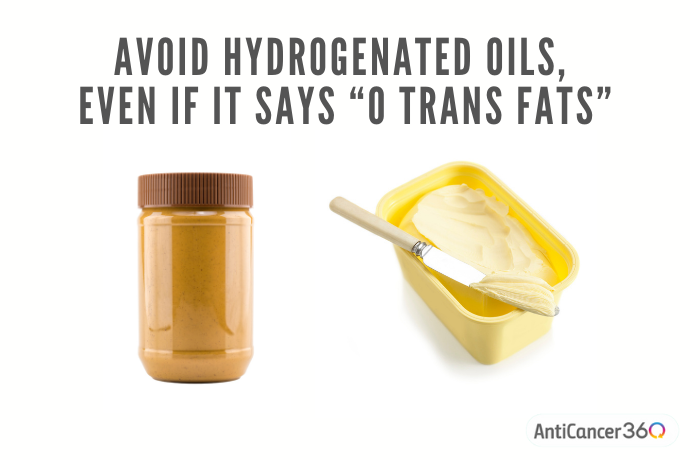
This is especially important for you if you’re fighting cancer.
You Need To Choose High Quality Fats
Here’s another important detail that you have to know. Omega 6 fats aren’t the villain that they are portrayed to be.
If you’re in tune with the world of health, you’ve probably heard that omega 6 fats are “bad fats.”
This is not the case.
They can definitely be bad if they are too far out of balance with omega 3’s [9].
They are bad if they come from poor quality commercial vegetable oils [10].
But omega 6’s in and of themselves are a super important part of cell function.
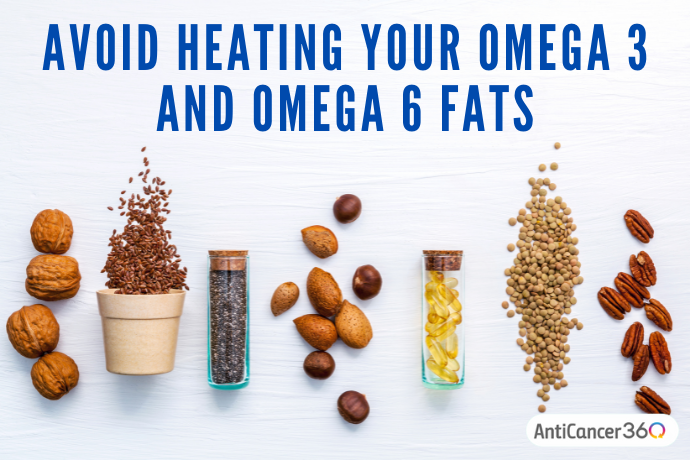
In fact, like we talked about before… when researchers fed mice a diet that was completely lacking in 6, their cell respiration dropped significantly [11]. In this experiment:
- A pure 3 fish oil diet actually decreased cell respiration the most.
- Hydrogenated corn oil also caused low respiration.
- But 6 rich natural corn oil allowed for normal cell respiration.
Monounsaturated fats (like olive and avocado) would also likely cause cell respiration to drop so you don’t want to focus on these over the omega 3 and 6 fats [12].
And even though omega 6 has developed a reputation of being proinflammatory… one of the most important anti-inflammatory substances in our bodies(PGE-1) is created out of omega 6 fats [13],[14].
Some researchers have even found that the interaction between omega 3 and 6 is what gives you the benefit, not just omega 3’s alone [15].
Evern Harvard has come out saying that omega 6’s aren’t bad, but they just need to be in balance with omega 3’s [16].
Get Cold Pressed Omega Oils And Never Heat Them
So now you know why 6’s are actually really important. But in order to get the “good omega 6’s” in your diet, you’ll want to get them from “cold pressed” sources, and NEVER heat them.
Many of you know that you shouldn’t heat omega 3 oils like flax oil or chia seed oil. But 6’s are just as sensitive to heat. Yet, we often use oils that are high in omega 6 for cooking and frying [17]. That’s partly why omega 6’s have gotten such a bad reputation.
- So, you’ll want to get your omega 6’s from things like raw nuts and seeds, as well as cold pressed oils.
- Hemp seed oil is a pretty good balanced ratio of omega 3 to 6 already.
- Chia seed or flax oils are also great, and they are much higher in 3.
- And in many health foods stores, you can find cold pressed pumpkin seeds oil. This is almost all omega 6, so you’ll want to take it with some of the other oils above.
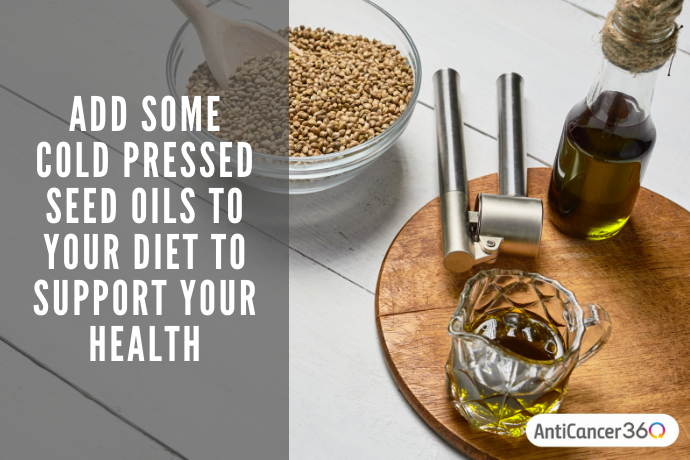
And remember, never heat these oils. Don’t blend them with a high speed blender either since this can also damage these sensitive fats via oxidation.
If you mix them into a smoothie, please just shake it up before drinking.
Choose Heat Resistant Healthy Fats To Cook With
So since you can’t cook with the omega 3 and 6 oils… you’ll also want to have some healthy heat resistant oils that you can use for cooking.
I usually have people split this between coconut oil and the monounsaturated oils (olive, avocado, almond, sunflower/ safflower (high oleic type) and/or macadamia nut oil.)
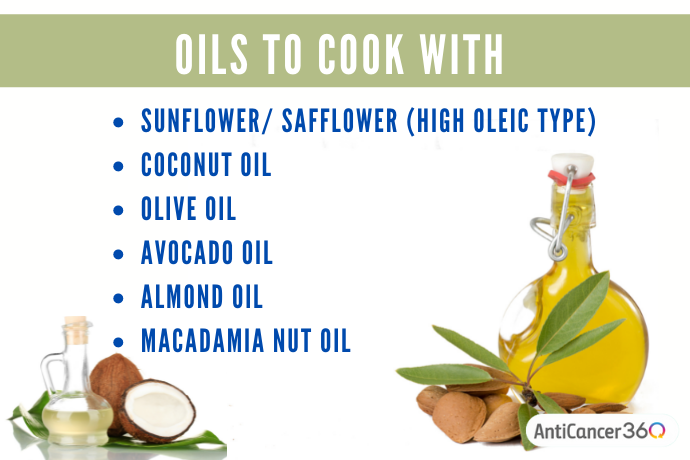
Now, one of the most important aspects of choosing a cooking oil is the heat resistance. And the more resistant to heat it is, the better it is for cooking. Many of these oils will be labeled with a “smoke point” temperature which you’ll want to pay attention to also.
And many of these cooking oils will be refined… which can be ok since this makes them more resilient to heating . Just make sure that the refining process was a “biologically friendly one” that didn’t use toxic chemicals in the process.
If it says “naturally refined” or it comes from a reputable “health focused” brand, then you should be ok. “Spectrum” brand oils are a good example of this since they use a non toxic refining process.
A naturally refined oil will get you a higher smoking point. But really, you should also cook with the lowest heat that you can. High heat applied to oils is one of the biggest sources of cancer promoting chemicals in our diet.
You Should Consider Some Supplement Oils Also
So now that you know what types of oils to include in your diet, and how to use them properly… you’ll also want to consider certain supplement oils.
These are more specific oils that can be really beneficial, and they can be really difficult to get in adequate amounts in your food.
EPA + DHA: This is the fish oil fraction of 3 fats (different from ALA from things like flax.) Your body can create EPA and DHA from ALA, but many people’s bodies may not do this very well so it’s best to also supplement.
Consider also that the fish you eat is only as healthy as it’s diet and many fish today are farmed fish. These often have really unbalanced omega 3 to 6 ratios. They can also have a lot of toxic substances used in the farming process. In fact, farmed salmon may be one of the most toxic foods on the market.
Even wild fish can have issues. Many are high in mercury and other heavy metals. And there’s also the issue of microplastics in fish.
So getting a high quality, gently purified fish oil can be very important.
A good dosage for most people is 500mg to 1000mg per day taken with food (of the combined EPA and DHA fractions of the oil.)
If you are vegan or plant based, you can also get algae based EPA + DHA
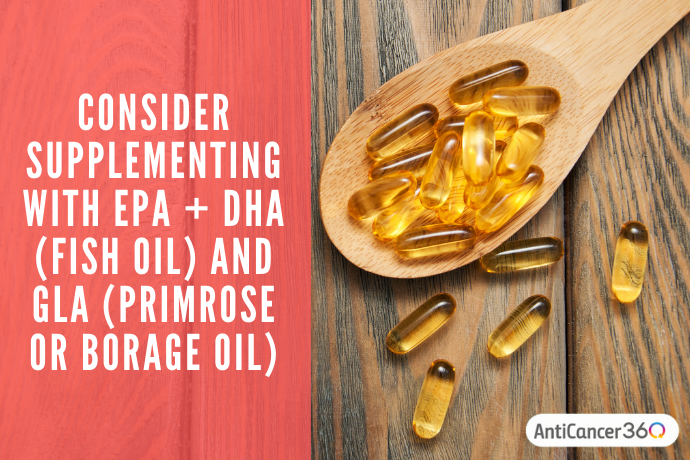
GLA: This is a fraction of omega 6 that can be especially beneficial and antiinflammatory. The most common sources of this fat are from “evening primrose,” “borage,” and black currant oil.” Scientists have also shown that it can help against cancer by upregulating a tumor suppressor called “maspin.” [18]
A good dosage for most people is 400mg to 600mg per day taken with food (this is of the GLA fraction of the oil.)
Fats Are Important For Calories And Are The Least Cancer Stimulating Nutrient
So aside from these health promoting aspects, fats can also be an important source of calories.
In everyday situations, fat can be a nuisance since many of us get too many calories in our diet for our needs.
But as someone who may be fighting cancer, you may need MORE calories since you may be losing weight from lack of appetite caused by cancer treatments, or from the cancer itself.
Fortunately, fats are also the densest nutrient in terms of calories. And because of this, eating more fats is the easier way to meet your daily calorie needs.
Consider this also…
When oncologists say “just eat whatever you can to get your calories…” I don’t fully agree.
Because yes, getting enough calories is important. BUT the types of calories you put in your body can be more, or less cancer stimulating, depending on where these calories are coming from.
According to Sloan Kettering…
- Carbohydrates are the most cancer stimulating.
- Protein is second.
- And fats are the least cancer stimulating nutrient.
So not only are fats the easiest way to get the calories that you may need, they are also the least cancer stimulating nutrient.
Will You Choose Your Fat’s Wisely While Fighting Cancer?
So as you know now… it’s very important to know what kinds of fats you should focus on, and which fats to avoid when you’re fighting cancer.
- Fats provide us with important calories when we need them.
- They can control cell oxygenation and respiration.
- And, they can control inflammation in our bodies.
Ultimately, you can see that there can be many potential benefits to including or excluding certain fats in your diet when you are fighting cancer.
And when using the “Aggressive Integrative Approach” to cancer, the goal is to fight cancer from every possible angle. This approach includes integrating natural supplements to fight cancer based on available evidence, despite limited human data, and doing it in a safe way that won’t interfere with your oncology treatments.
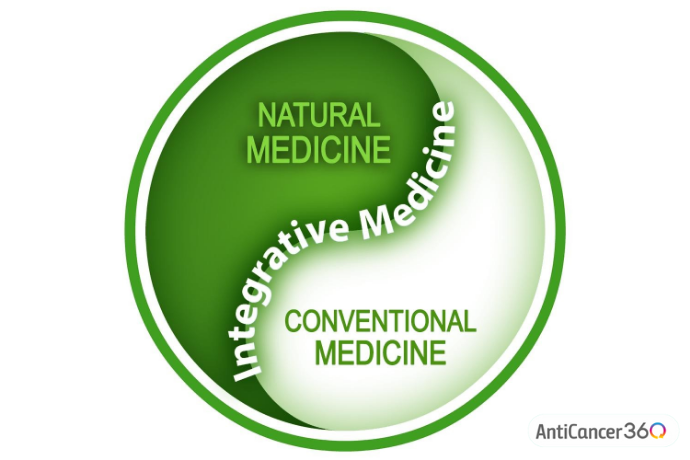
So now, what are your thoughts about incorporating certain fats into your overall plan? What are you doing to support your body? Are you currently taking omega 3’s or any other natural supplements? We would love to hear from you. Feel free to let us know in the comments below!
If you’re interested in using an Aggressive Integrative Approach for your case… you can learn more about our program by watching one of our free online webinars.
Please discuss the risk-versus-benefit potential with your healthcare professional before starting any natural supplement, or dietary change.
Want To Work With Us?
If you’d like to learn more about the AntiCancer360 approach and see if we can help you… please watch our free online webinar to learn more about our approach. Then at the end of the webinar, you’ll be able to schedule a free call with us so that we can discuss your case in more detail
Gene Wei is a Board Certified Doctor of Oriental Medicine in the state of Florida, and the founder of AntiCancer360. He’s also a graduate of the University of California Los Angeles, and East West College of Natural Medicine.
His practice is focused on integrative and natural anticancer strategies. Over the years, he’s helped many people overcome difficult cancers… including some cases of “terminal cancer” which were able to be reversed with an “Aggressive Integrative Approach.”

